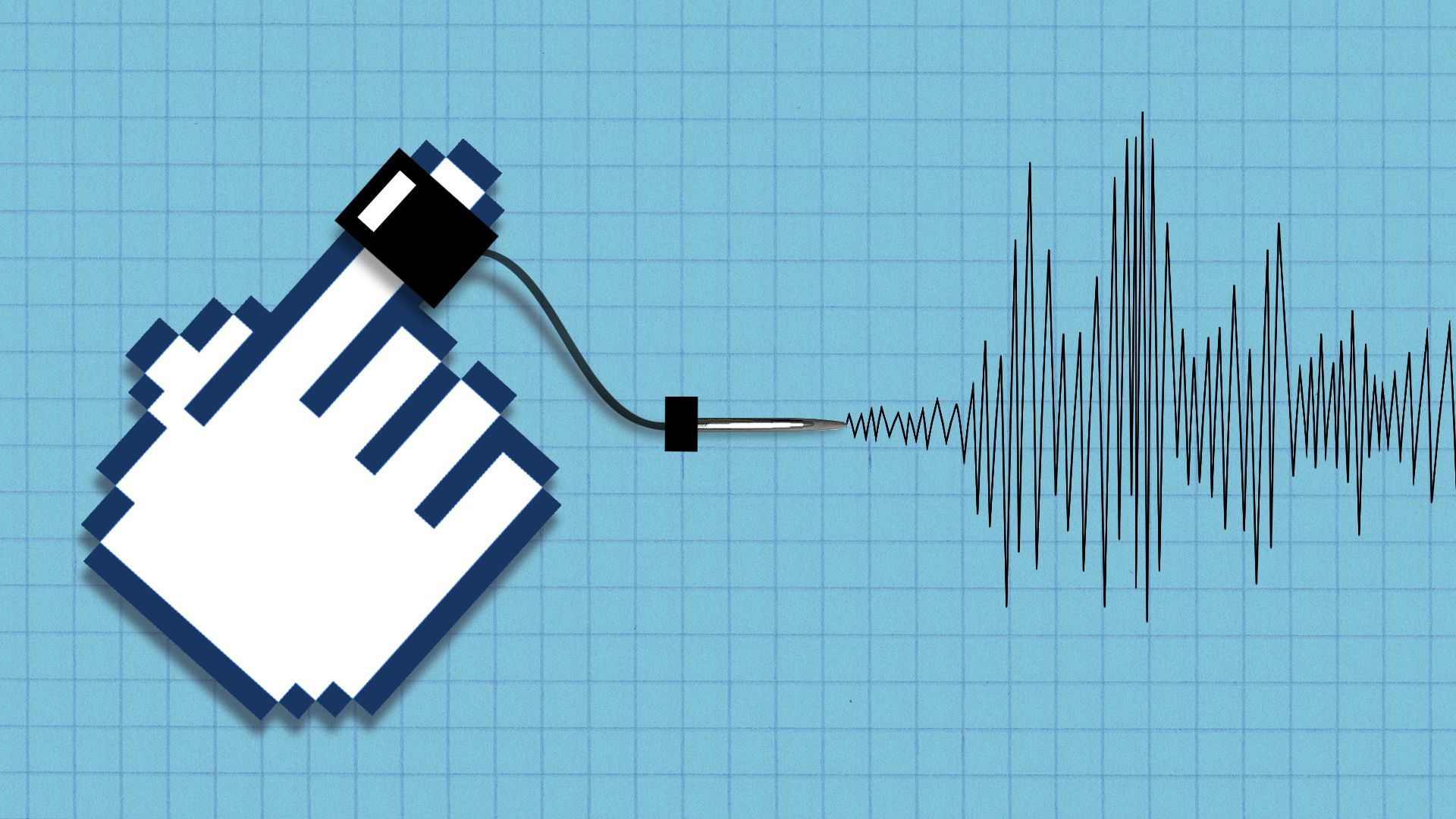Tech's misinformation fight: Winning the battle, not the war
Add Axios as your preferred source to
see more of our stories on Google.

Illustration: Annelise Capossela/Axios
Although tech platforms have made good on promises to check false election claims from political figures — up to and including the president — those efforts haven't turned the tide in the broader war on misinformation.
Between the lines: Dedicated spreaders of misinformation are finding ways around platforms' rules. Sometimes enforcement actions themselves provide fresh fuel for otherwise baseless conspiracy theories that the media, Big Tech and Democrats are colluding to steal the election from President Trump.
What's happening: Facebook, Twitter and YouTube spent Wednesday labeling content that spread misinformation such as false claims about fraudulent ballot counts in crucial swing states.
- Twitter's policy is the most aggressive: It hides posts with misleading claims about the electoral process, and limits users' ability to share them. Wednesday it applied the rule extensively, including to several of Trump's messages.
- Facebook simply added labels to such content that link users to election information hubs.
- YouTube put labels on at least some videos. One from the conservative TV network OANN that claimed Arizona and Nevada are "rampant with voter fraud" had a note appended to it which said the results may not be final.
Premature victory claims faced a milder fate on Twitter, receiving labels that stated the tweet in question seemed to be coming before results were official.
- Twitter labeled tweets on the right and left. Those included an early claim from Wisconsin Democratic party chair Ben Wikler that Vice President Joe Biden had won the state.
- Wednesday afternoon, Twitter also flagged a series of claims that Trump had won Pennsylvania in tweets from figures in Trump's orbit, including Eric Trump and White House press secretary Kayleigh McEnany,
- Facebook had originally said it would only label claims of premature victory in the national race, but it did end up labeling the Pennsylvania claims.
- Separately, Facebook put a label on a post from President Trump saying there were attempts to "steal" the election. The label said final results were not in yet, but did not say the information was misleading. It also labeled a post from Biden saying, "We're gonna win this."
The catch: Although the platforms generally flagged problematic content in fairly short order, there was still time for many of the claims to catch a lot of attention before they got flagged. Many quickly became conventional wisdom in online ideological echo chambers in a matter of minutes.
- Even with tech firms' checks, a baseless conspiracy theory that Republicans were given Sharpies to mark their ballots in Arizona so that election officials could throw them out spread widely enough to trigger an inquiry from Arizona's Republican attorney general.
- The broader, equally baseless idea that Democrats in key states were falsifying vote counts to steal the election also gained traction with a hashtag — #StopTheSteal — endorsed by people including Marjorie Taylor Greene, the former QAnon conspiracy theory promoter who won a U.S. House race in Georgia Tuesday.
Meanwhile: There was also a notable loophole in the companies' election misinformation policies: They only applied to claims made directly on the platforms. People could share misinformation unchecked if they were quoting or presenting a clip of comments made off-platform.
- That meant, for instance, a tweet from MSNBC's Kyle Griffin quoting Biden attorney Bob Bauer as saying, "We've won the election" got no label despite repeating a premature declaration of victory.
Be smart: The platforms' content flags often set up a feedback loop in which many of those spreading misinformation said the platform's actions were themselves proof of a conspiracy — that Silicon Valley was muzzling dissent to cover up a plot to steal the election.
One bright spot: Foreign actors like Russia's Internet Research Agency have failed to spread much misinformation, making sporadic efforts but falling flat, said Camille François, the chief information officer of Graphika, in a call with reporters hosted by the Election Integrity Project on Wednesday.
What's next: Slow ballot-counting in battleground states gives misinformation and conspiracy theories a chance to get more traction, experts say.
- Experts suggest keeping an eye on encrypted messaging channels: "When we don't see extremist groups talking in public, it means they're talking in private," said Graham Bookie of the Atlantic Council.

